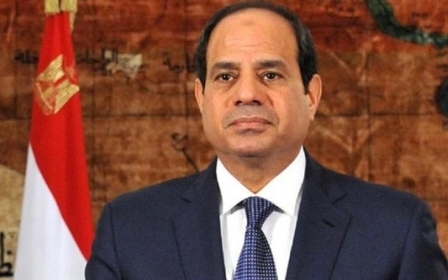Tony Blair: Curbing Gaddafi's WMD efforts has helped prevent IS chemical attacks

Tony Blair has said his efforts to bring Muammar Gaddafi "in from the cold" may have helped prevent the Islamic State group gaining chemical weapons.
In evidence to a British parliamentary committee on UK foreign policy on Friday, the former prime minister said Libya's signing of the Convention on Chemical Weapons had "important" implications today.
Blair met Gaddafi in 2004, when the then Libyan leader announced an end to his attempts to acquire weapons of mass destruction.
Giving evidence to the House of Commons foreign affairs committee, Mr Blair said he believed his decisions in the early part of the last decade were "important" for the situation today.
"Otherwise, we would have had a situation where Libya was continuing to sponsor terrorism, was continuing to develop chemical and nuclear weapons and would have remained isolated in the international community".
He said the end of Gaddafi's WMD programmes had arguably kept such weapons out of the hands of the Islamic State group.
"I think it is important that we brought [Gaddafi] in from the cold, as it were, and important also in today's context because I think - particularly if we had still had the residue of that chemical weapons programme in Libya today, given the state of Libya today and given the presence of Isis there - it would have constituted a real risk, even today."
Reports have however suggested that the remnants of Gaddafi's chemical stockpile have indeed fallen into the hands of the IS group, which has been accused of using mustard gas in Syria.
After Gaddafi's fall, Libyan rebels reported that the country was still in possession of up to 10 tonnes of mustard gas precursors. Huge amounts of weapons have been smuggled from Libya for use in the Syrian war.
Blair left office before Gaddafi was toppled in a rebellion in 2011, which was aided by air power from a NATO coalition including the UK.
Of the decision to aid his removal, Blair said: "You often find people saying 'look wouldn't it just be better if we dealt with the dictators? I completely understand that argument.
"But I think what the Arab Spring shows you is that however much we may want to have dealt with these people, the populations of these countries are not going to tolerate it.
"Obviously Libya is a real security problem. But I don't think you can make the judgment as to whether it would be better if we had not intervened.
"Because you then have got to say how would that then have played out as Gaddafi tried to cling on to power and others tried to remove him. You can look at Syria today where we didn't intervene by the way and say that is even worse."
Stay informed with MEE's newsletters
Sign up to get the latest alerts, insights and analysis, starting with Turkey Unpacked
Middle East Eye delivers independent and unrivalled coverage and analysis of the Middle East, North Africa and beyond. To learn more about republishing this content and the associated fees, please fill out this form. More about MEE can be found here.




